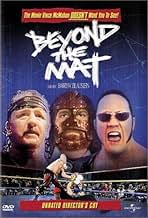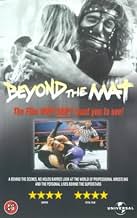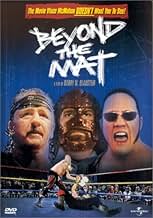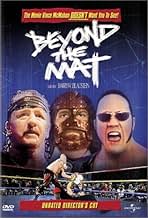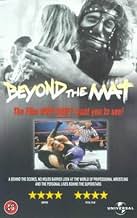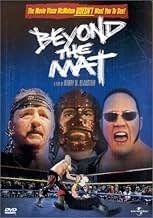AVALIAÇÃO DA IMDb
7,6/10
9,7 mil
SUA AVALIAÇÃO
Adicionar um enredo no seu idiomaA heartfelt documentary focusing on the day-to-day lives of professional wrestlers, some on the rise, some on the wane, and others fighting for their lives.A heartfelt documentary focusing on the day-to-day lives of professional wrestlers, some on the rise, some on the wane, and others fighting for their lives.A heartfelt documentary focusing on the day-to-day lives of professional wrestlers, some on the rise, some on the wane, and others fighting for their lives.
- Prêmios
- 3 vitórias e 2 indicações no total
James Ware
- Self
- (as Coco B. Ware)
Avaliações em destaque
This is the greatest insiders look in wrestling of all time. We look at not only those individuals as characters but also as people. Terry Funk, New Jack, Mick Foley and Jake Roberts are to name just a few in this film and even if you're not a fan of wrestling or you think that wrestling is fake then look at this film and see that it's more real than people think.
Vince McMahon doesn't want you to see it. See it and it will open your eyes.
Vince McMahon doesn't want you to see it. See it and it will open your eyes.
As a wrestling fan, when I saw this movie in the video store, I had to get it. Thinking I'd be seeing nothing more than an overview of pro wrestling, I was pleasantly surprised to see this documentary by filmmaker Blaustein that incorporates all the major wrestling organizations in the U.S. and also some of the greatest wrestlers ever to step in the ring...including a few personal favorites like Mick Foley and Terry Funk. In showing these wrestlers as humans, Blaustein has created a view of wrestling unique in a world of trickery and promotional stunts. This is one helluva documentary going behind the scenes of all the wrestling promotions, showing the real people involved, and in the end shows the viewer that, indeed, in wrestling nothing as it seems. A few of the highlights include a touching, and tragic, portrayal of mat legend Jake "The Snake" Roberts, behind the scenes of a WWF pay-per-view, and the story of hardcore legend Mick Foley. I would highly recommend this to anyone...it is an entertaining and revealing film that I think even non-wrestling fans would enjoy.
You've got to wonder about wrestlers. They're always on the road, they're always carrying knocks and injuries, they don't get paid much (except the few at the absolute top), they get no respect from the public at large, they don't actually compete in the legitimate sense of the word and the vast majority of them are quickly forgotten. Yet nearly all of the wrestlers in Beyond the Mat continue to seek the spotlight. Why? I guess Terry Funk sums it up best: "It's fun."
However, it's a strange type of fun. After all, I'm not sure that most people would class being hit over the head with steel chairs as 'fun'. Nor would most people relish the thought of being thrown off a steel cage. But as the film points out, wrestlers are hardly normal. At the same time, though, they're still people. They have the same problems as all of us. It's just that they earn their living by running around in spandex and by beating the crap out of one another.
Of all the different strands in Beyond the Mat, I like the Terry Funk section the most. It just shows how bizarre wrestling is. Here you have a man in his fifties who has degenerative arthritis and who wakes up in the morning, like many old men, in his y-fronts. Yet in the ring he's a bloodthirsty maniac. But at the same time he's a loving father who cries at his daughter's wedding and he has an excellent rapport with the man who he has his most brutal matches with. As dim-witted as wrestling is, nothing out of the ring is simple.
And the Funk section illustrates the problem that most wrestler face: they can't give up the spotlight. I mean, just take one of Funk's friends, Dennis Stamp. He hasn't wrestled in years but he still trains (by jumping up and down on a trampoline in his underwear) in the vain hope of getting another match. And when he's finally made the referee in Funk's 'retirement' match, he's beside himself with excitement at the prospect of being part of the main event. It seems like when you don't get paid much, when you're forced to do lousy jobs and when no one really knows who you are, the only compensation for such a depressing existence is a few cheers.
But although the film touches upon the dark side of wrestling, it's quite touching seeing Funk trying to persuade his friend Stamp to be part of his match. The man may be vicious in the ring, but outside it he's warm-hearted. And I like the way that when he persuades his friend to be part of his match, and when he walks away, he nearly trips over. Despite everything, he's just a lovable old guy. However, I also like the scene because Stamp is such a fool. He's so desperate to be someone and so desperate to be recognised, that he cuts a promo when he's explaining why he can't make the event ("I'm not booked!). It's as if reality and wrestling are blurred. He can't tell them apart.
Another wrestler who's been messed up by the business is Jake Roberts. He doesn't get on with his daughter and he's forced to pay for his drug habit by wrestling in fourth-rate events in backwater towns. He's even filmed urinating into a bucket and then falling asleep backstage. It really does give a depressing picture of what it is to be a professional wrestler your existence revolves around the road, run down hotels and small towns. No wonder so many of them are screwed up. But Roberts has even more reason to be screwed up than most. He's the product of a rape and his sister was kidnapped and murdered. And he has a terrible relationship with his father. They can barely look at one another. There's no connection there at all. And it's quite shocking hearing Roberts describe how he gave up his dreams just to shove wrestling down his father's throat (his dad was a wrestler and Robert's resolved to be better than him). Suddenly you can see why Robert's created such a compelling character. He was just drawing on his own life. Again reality and wrestling is blurred.
Perhaps the only one in the film that has a decent handle on things is Mick Foley. He has a clear plan (he wants to retire by the age of 35) and he has a solid family to support him. Somehow you know that he's going to be fine. Not that there aren't a few bumps on the way. In one scene he's forced to watch footage of his wife and kids screaming when he's repeatedly hit over the head with a steel chair. It's a real wake-up call. I mean, as entertaining as it is for sadistic bastards like myself, you just can't make you family endure that time after time. But it's his family that will keep Foley on the straight and narrow. However, for the other wrestlers who don't have stable personal lives, they'll have to seek love in cheers and applause. It seems like wrestling is a drug that most wrestlers can't crack.
Not that a few don't try. There's an amusing scene when a wrestler called New Jack, who has four justifiable homicides, auditions for a Hollywood casting agent. The people there are slimy beyond belief. They make the carnies in wrestling look honest in comparison.
But why the film succeeds so emphatically is because everything is just presented as it is. No judgements are made and nobody is looked down upon. Yeah, wrestling may be something on the fringes of society, but the film shows that as weird as it is, the people aren't really that weird after all. They're just people with the same problems we all have.
However, it's a strange type of fun. After all, I'm not sure that most people would class being hit over the head with steel chairs as 'fun'. Nor would most people relish the thought of being thrown off a steel cage. But as the film points out, wrestlers are hardly normal. At the same time, though, they're still people. They have the same problems as all of us. It's just that they earn their living by running around in spandex and by beating the crap out of one another.
Of all the different strands in Beyond the Mat, I like the Terry Funk section the most. It just shows how bizarre wrestling is. Here you have a man in his fifties who has degenerative arthritis and who wakes up in the morning, like many old men, in his y-fronts. Yet in the ring he's a bloodthirsty maniac. But at the same time he's a loving father who cries at his daughter's wedding and he has an excellent rapport with the man who he has his most brutal matches with. As dim-witted as wrestling is, nothing out of the ring is simple.
And the Funk section illustrates the problem that most wrestler face: they can't give up the spotlight. I mean, just take one of Funk's friends, Dennis Stamp. He hasn't wrestled in years but he still trains (by jumping up and down on a trampoline in his underwear) in the vain hope of getting another match. And when he's finally made the referee in Funk's 'retirement' match, he's beside himself with excitement at the prospect of being part of the main event. It seems like when you don't get paid much, when you're forced to do lousy jobs and when no one really knows who you are, the only compensation for such a depressing existence is a few cheers.
But although the film touches upon the dark side of wrestling, it's quite touching seeing Funk trying to persuade his friend Stamp to be part of his match. The man may be vicious in the ring, but outside it he's warm-hearted. And I like the way that when he persuades his friend to be part of his match, and when he walks away, he nearly trips over. Despite everything, he's just a lovable old guy. However, I also like the scene because Stamp is such a fool. He's so desperate to be someone and so desperate to be recognised, that he cuts a promo when he's explaining why he can't make the event ("I'm not booked!). It's as if reality and wrestling are blurred. He can't tell them apart.
Another wrestler who's been messed up by the business is Jake Roberts. He doesn't get on with his daughter and he's forced to pay for his drug habit by wrestling in fourth-rate events in backwater towns. He's even filmed urinating into a bucket and then falling asleep backstage. It really does give a depressing picture of what it is to be a professional wrestler your existence revolves around the road, run down hotels and small towns. No wonder so many of them are screwed up. But Roberts has even more reason to be screwed up than most. He's the product of a rape and his sister was kidnapped and murdered. And he has a terrible relationship with his father. They can barely look at one another. There's no connection there at all. And it's quite shocking hearing Roberts describe how he gave up his dreams just to shove wrestling down his father's throat (his dad was a wrestler and Robert's resolved to be better than him). Suddenly you can see why Robert's created such a compelling character. He was just drawing on his own life. Again reality and wrestling is blurred.
Perhaps the only one in the film that has a decent handle on things is Mick Foley. He has a clear plan (he wants to retire by the age of 35) and he has a solid family to support him. Somehow you know that he's going to be fine. Not that there aren't a few bumps on the way. In one scene he's forced to watch footage of his wife and kids screaming when he's repeatedly hit over the head with a steel chair. It's a real wake-up call. I mean, as entertaining as it is for sadistic bastards like myself, you just can't make you family endure that time after time. But it's his family that will keep Foley on the straight and narrow. However, for the other wrestlers who don't have stable personal lives, they'll have to seek love in cheers and applause. It seems like wrestling is a drug that most wrestlers can't crack.
Not that a few don't try. There's an amusing scene when a wrestler called New Jack, who has four justifiable homicides, auditions for a Hollywood casting agent. The people there are slimy beyond belief. They make the carnies in wrestling look honest in comparison.
But why the film succeeds so emphatically is because everything is just presented as it is. No judgements are made and nobody is looked down upon. Yeah, wrestling may be something on the fringes of society, but the film shows that as weird as it is, the people aren't really that weird after all. They're just people with the same problems we all have.
This great documentary goes behind the scenes and shows us a side of wrestling that we rarely get to see. In particular, it focuses on three legendary wrestlers, and their stories should provoke a wide range of emotions from every viewer. There are other stories as well, but these were generally much less interesting, and the film works best when the focus is on Mick Foley, Terry Funk, or Jake Roberts. Their stories were all compelling, and wrestling-haters who are usually so quick to dismiss this business as "fake" should take a look at this movie and see just how real it can be.
I enjoyed Beyond the Mat because it gave us an insiders view of wrestling. But to be honest it was quite disturbing at times.
In a way it can shatter a fans illusions. We fans seem to think of wrestlers as superhuman beings-we forget that they have personal needs, families, wives, girlfriends, children etc. This movie shows us how wrestlers lives can be changed due to their devotion to keeping the fans entertained.
I won't spoil any of the film but one example is Jake "The Snake" Roberts. I watched Jake wrestle in the WWF from 1986-1992 and to me he was a brilliant wrestler who had it all-how wrong I was. It showed us another side to Jake Roberts-the human side who has sacrificed a lot to become a wrestler, including family.
This is a thought provoking movie which helps remind us that wrestlers are human after all and that they spend a lot of time away from their loved ones putting their bodies on the line purely to keep us entertained. If anything, this movie helps us appreciate the wrestlers even more.
In a way it can shatter a fans illusions. We fans seem to think of wrestlers as superhuman beings-we forget that they have personal needs, families, wives, girlfriends, children etc. This movie shows us how wrestlers lives can be changed due to their devotion to keeping the fans entertained.
I won't spoil any of the film but one example is Jake "The Snake" Roberts. I watched Jake wrestle in the WWF from 1986-1992 and to me he was a brilliant wrestler who had it all-how wrong I was. It showed us another side to Jake Roberts-the human side who has sacrificed a lot to become a wrestler, including family.
This is a thought provoking movie which helps remind us that wrestlers are human after all and that they spend a lot of time away from their loved ones putting their bodies on the line purely to keep us entertained. If anything, this movie helps us appreciate the wrestlers even more.
Você sabia?
- CuriosidadesWrestling legend Roddy Piper described this film as "The best documentary ever made on professional wrestling."
- Citações
Jake Roberts: My mother was 13 years old when I was born. Why? Because my dad raped a little girl that was in a room asleep. My dad was going out with my mother's mother. There you go. There's some bones for Jake the Snake.
- Cenas durante ou pós-créditosClosing dedication: This film is dedicated to my wife, Lorrie and our children, Kasey and Corey, who have stood by patiently with love and support as I blabbed about wrestling for the last five years.
- Versões alternativasThe DVD edition of Beyond the Mat has several minutes of deleted footage, plus audio commentaries by Mick Foley & Terry Funk
- ConexõesFeatured in WatchMojo: Top 10 Controversial Documentary Movies (2015)
Principais escolhas
Faça login para avaliar e ver a lista de recomendações personalizadas
Detalhes
- Data de lançamento
- País de origem
- Central de atendimento oficial
- Idioma
- Também conhecido como
- Beyond the Mat
- Locações de filme
- Empresas de produção
- Consulte mais créditos da empresa na IMDbPro
Bilheteria
- Orçamento
- US$ 500.000 (estimativa)
- Faturamento bruto nos EUA e Canadá
- US$ 2.053.648
- Fim de semana de estreia nos EUA e Canadá
- US$ 9.532
- 24 de out. de 1999
- Faturamento bruto mundial
- US$ 2.053.648
- Tempo de duração
- 1 h 42 min(102 min)
- Cor
- Mixagem de som
- Proporção
- 1.85 : 1
Contribua para esta página
Sugerir uma alteração ou adicionar conteúdo ausente


